To gay rugby, with love – Matt Carter on making ‘In From The Side’
The ongoing global expansion of inclusive rugby clubs is one of the success stories of LGBTQ+ sports and a major inspiration behind new movie ‘In From The Side’. Writer-director Matt Carter talks exclusively to Sports Media LGBT+ about the film’s world premiere, telling gay stories on screen, and his rugby passion…
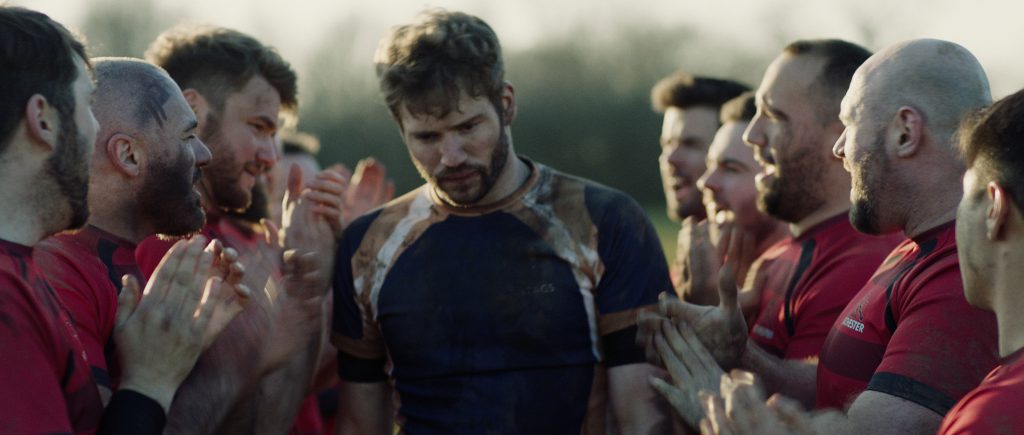
With over 100 clubs now affiliated worldwide, the IGR rugby community is a global family that is recognised and respected by the game’s governing bodies – but that’s not common knowledge.
This was emphasised by a comment made in the Q&A after the premiere of In From The Side at the BFI Flare: London LGBTQIA+ Film Festival. An audience member light-heartedly asked the rhetorical question: “Who even knew gay rugby existed?!”
The auditorium – full of people immersed and connected with the inclusive sport – understood the point that was being made. One of the most rewarding activities queer people can get involved in is now getting major cultural exposure and a chance to shine up on the big screen. It’s a significant step.

The film-maker responsible for this is Matt Carter, who took on a head-spinning range of roles – director, writer, producer, cinematographer, visual effects, composer, even a blink-and-you’ll-miss-it cameo.
Driving his ambition forwards was the enjoyment he has found in gay rugby as a player and a coach over several years. It’s all there – heart and soul – as a feature-length drama of ‘deep heat’ passion unfolds against a muddy backdrop of bravado, brotherhood, and bruises.
The plot revolves around Mark (Alexander Lincoln), making his way through London life as a happily out young gay man, coupled up with an older boyfriend who’s often away on business. Mark is also one of the best backs on the ‘B’ XV at his inclusive rugby club, where bonds are tight-knit even though team dynamics can be complex due to the competitive nature between the ‘A’ and ‘B’ sides.
It’s in the build-up and breakdown of these relationships that In From The Side draws its energy, throwing Mark onto a collision course of lust with ‘A’ teamer Warren (Alexander King) – whose long-term boyfriend is also established within the club – that threatens to fracture his close friendship with Henry (William Hearle). Meanwhile, the love story to rugby itself is unbroken, with care and attention paid to every thud and squelch, putting the viewer right in the thick of the action.
After years of sweat and toil that included a Kickstarter in 2018, shooting in 2019, and editing and post-production which continued amid the pandemic – plus the creation of an original soundtrack – Carter is now getting to see how audiences react to the film. Where it goes next after BFI Flare is yet to be announced, but what’s certain is that anyone connected with gay rugby will be eager to catch it, and it thoroughly deserves to find broad support from outside IGR circles too.

Sports Media LGBT+ grabbed Carter for a chat after the premiere to talk about the screening, the making of ‘In From The Side’, and why it’s a groundbreaking cultural moment for rugby…
JH: Hi Matt, many congratulations on what you and all your cast and crew have achieved. What’s it like to now be seeing the film with a full auditorium?
MC: Thank you! We had a cast and crew screening before the premiere – it was on a much smaller screen than NFT1 at the BFI, but that was the first time we’d seen it with an audience. It’s a surprising experience because there are moments that you know are funny, that will get the laughs and an audience reaction, but then there are these unusual parts where it happens too. You might think, ‘oh, I didn’t really intend that to be funny’ – but those moments can be when you watch it.
So it’s fun to witness those reactions and also the ones that aren’t laughs, the tense moments – you can actually sense the tension in the audience. That’s very exciting to watch, especially with an audience as big as you can have in NFT1.
This movie has clearly been an enormous labour of love. There’s a scene in particular when the team goes to Cardiff to play a match in bad weather conditions that conveys a lot about rugby as a sport – it’s so visceral…
Yeah, I’ve been sitting with this for three years, refining all these things, so I’ve watched the film a million times at home!
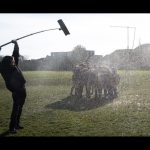
Talking about that Cardiff match, I sound designed all of that. I’m meticulous and a real perfectionist – and that shoot was one of the most challenging because we had a rain machine. You’re essentially trying to shoot a whole pitch’s worth of content but the rain machine gives you only about a 10m square to work within, so you have to use it creatively to shoot wider shots.
But I knew how I was going to edit it, that I wanted it to be a montage and that the music would do a lot of the heavy work – which put even more pressure on me when I came to write that piece of music!
And after all that hard work in post-production, now the movie is starting its next phase – screenings. How is that going at this early stage?
It’s really wonderful to now see all these reactions, to see that people like it, and in some sense to have that validation. Of course, I’ve always thought it was a good project but also that it’s a meaningful, deep film. So for people to be receiving it in the way that it’s intended, and having them notice all the little details and read into them, is very satisfying.
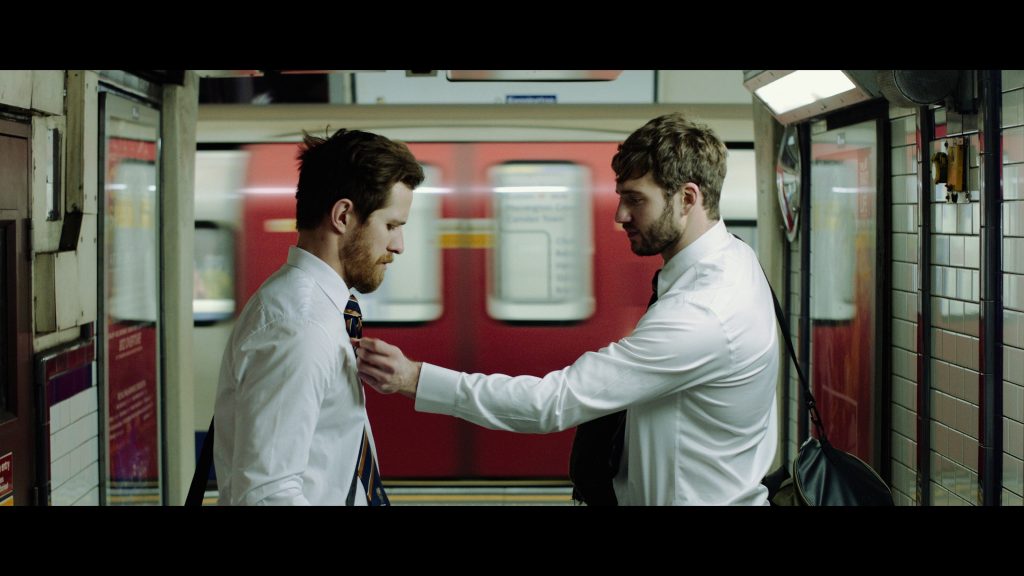
Gay rugby keeps growing, with new IGR clubs being formed every year around the world. How do you envisage ‘In From The Side’ contributing to that momentum?
That was entirely an intention, to bring this to a wider audience. Because it’s not just rugby – a lot of people don’t realise that inclusive sport generally is something that exists. You find that a lot of queer youth who had a bad experience of sport then never return because they think it’s not for them or that it only belongs in the heteronormative world.
Sport is for everyone and it can bring so much benefit and wellbeing to people’s lives. I really wanted to make something that would not only be an entertaining piece of film but also make people go, ‘actually, that looks quite fun, I’d like to do that’ – and then look up their local rugby club.
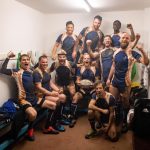
We have ‘inclusive rugby’ as seen in the movie – clubs that are specifically purpose-built as inclusive for people in the LGBTQ+ community – but rugby as a sport generally is unique in the sense that it’s very inclusive anyway. It’s built into the culture, almost. Lots of rugby clubs now have out queer people who feel comfortable being themselves in those spaces. As a result, people are now realising that there’s this wealth of talent and athletic ability from the queer community that they’ve been missing out on before.
So the film can help with that. Rugby is always about trying to increase membership – one of the things that clubs tend to struggle with is the continual loss of people who retire, get injured, or leave. But you’ve got to keep that flow going in. I coach rugby as well, recruiting and training up people who have never played before. It’s really important to me to get queer people into sport and I’d be lying if I said that wasn’t a subtle aim of the film, to try and help do that by just promoting inclusive rugby to a wide audience.
I’m currently with the Brighton and Hove Sea Serpents, who are a really fantastic IGR club where I work with a brilliant head coach called Tom Foy. I’ve trained and coached with them for about a year or so. The club in the film is really an amalgamation of all the different clubs that I’ve known – it’s fictional but representative.
Always with queer cinema, there will be people who end up watching a movie like this on their own – maybe because of where they live, or their personal circumstances, or another reason. With that in mind, why was it important to show this side of masculinity?
That’s really interesting. I think there’ll be a lot of discussion around the concept of masculinity surrounding sport off the back of the film. There’s often a big assumption that because rugby is a very physical sport, it must be inherently, ‘toxically’ masculine – one of the things I deal with a lot is people having this sort of preconceived notion.
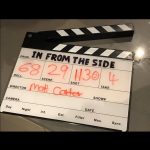
I wanted the film to show that you can explore healthy masculinity within this sport, and also that inclusive rugby accepts anyone on the spectrum of masculinity as well. As gay men, we might feel that masculinity is something that exists solely within the heteronormative domain and that we’re not welcome or it’s not for us. Actually, you can deepen your own exploration into masculinity and find out what that means in a non-toxic way, and how you can find brotherhood and community.
Doing that has such a powerful effect and it’s not something I’d really seen represented in film. Added to that, it was important that we made a decision early on that we’d have no ‘coming out’ storylines and we’d have no homophobia storylines. That’s because once you free yourself of that, it allows you to explore much more of the interpersonal relationships that happen in a group of authentic gay men – authentic in the sense that they’re happy with who they are.
These guys in the film don’t have to come out – they’re not dealing with that – so after that, what interpersonal difficulties and challenges do they have? There are so many stories to tell beyond just coming out and beyond homophobia. Of course, both of those themes are still valid and there are plenty of people telling those stories but there aren’t so many telling the other stories. That’s why it was important for me to do it.
What you’ve said there also reminds me of a scene in the film when Mark and Henry have just been to the cinema and they’re reacting in different ways. Their story arc is an important one alongside the relationship between Mark and Warren…
As gay men, we’ve probably all had a friend who we’ve fancied where it’s not been reciprocated. In fact, all of the characters in the film have very universal themes that anyone could experience – you don’t have to be a queer person to have someone you like who doesn’t like you back.
Mark, Henry, and the other characters all have their own little quirks and interesting things about them… it’s quite a thick, rich film in terms of there being a lot of themes and plots that go on. I wanted it to be really fleshed out and not a one-note story.
With men’s team sports portrayed in cinema, football is the one that has had a lot of screen time, but rugby not so much. Were there any influences on you from that perspective?
I’d love to say yes but one of the reasons I wanted to make In From The Side is because I just haven’t seen any really good rugby films.
The one people point to is Invictus but really that’s a story about South Africa and Mandela more than the rugby. When you look at the rugby, it’s quite sanitised – you’ve got big-name actors who obviously don’t want to get hurt – and it’s about the professional level of the sport. But when you think about the majority of rugby that’s played in the world, it’s at grassroots level – only a very small minority of people play as pros.
I’ve never seen the grassroots depicted and it’s a world that I’ve lived for eight years. I wanted to depict that authentically, in a way that’s actually believable – hopefully, people from inclusive rugby clubs or just rugby generally watch the film and go, ‘it’s exactly like that’. I really wanted to bring that to a wider audience because I’ve just never seen it before. I’d love to say that this film or that film influenced me but sadly there aren’t any, and that was a reason why I wanted to do it.

Thank you to Matt Carter, and also Sarah Bemand at the BFI. Follow @InFromTheSide on Instagram, Facebook and Twitter to get updates on the film’s release – you can also email enquiries@infromthesidemovie.com
Sports Media LGBT+ is a network, advocacy, and consultancy group that is helping to build a community of LGBTQ+ people and allies in sport. We’re also a digital publisher. Learn more about us here.
We’re interested in your news and stories! Share with us and tap into a worldwide audience through our Google News affiliate website – which pulled in over one million impressions in 2021 – and our popular social channels with over 10,000 followers. Contact us to discuss how we can help you.


